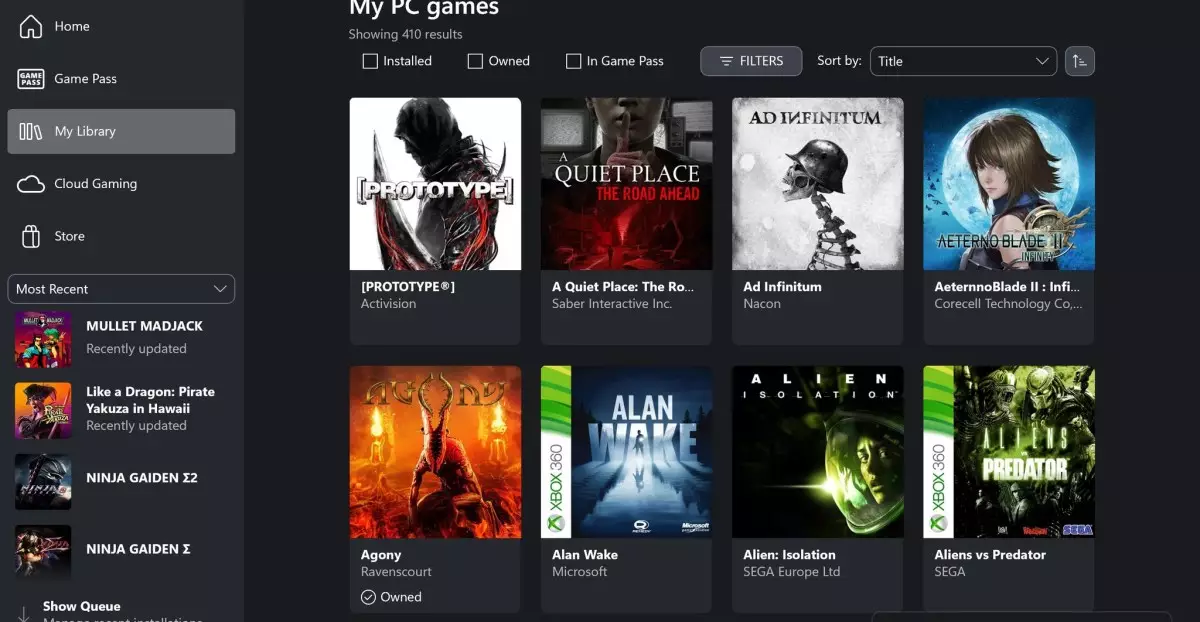The gaming industry is witnessing a transformative shift, and at the heart of this evolution is Microsoft, a tech giant that is constantly redefining the boundaries of gaming. The latest development involves the strategic alignment of its Xbox and Windows platforms, signaling a potential revolution in gaming accessibility. Recent revelations suggest that Microsoft is not merely tinkering with the Xbox app on Windows; it is laying the groundwork for an integrated ecosystem that could redefine how gamers access and interact with their libraries.
The Xbox app has begun to display console games within users’ libraries—a move that might seem trivial at first glance but represents a significant philosophical shift within Microsoft’s gaming strategy. While players can’t yet install classic titles like “Alan Wake” from the Xbox 360 era directly to their PCs, the mere act of showcasing them is indicative of a broader vision. This isn’t a glitch; it’s a harbinger of what is to come—a day when the lines separating PC and console gaming might blur seamlessly.
The Road to Integration
Tom Warren, a seasoned journalist with extensive experience covering Microsoft, has been at the forefront of this discussion. His insights highlight the company’s ambitious plan to unify its gaming services. The initiative, which Warren first reported in March, involves collaborations with companies like Asus for a handheld market that could potentially challenge gaming norms. This unified approach is likely to yield a “universal library” that encompasses both Xbox and PC games, catering to gamers’ diverse preferences and playstyles.
But the ambition extends beyond mere visibility. According to insider information, Microsoft’s lofty goal also includes showcasing games from competing platforms such as Steam and the Epic Games Store within the Xbox app. Imagine launching your favorite first-person shooter without needing to navigate multiple storefronts—it’s a dream scenario for gamers seeking convenience and efficiency.
Still, this sparks an important discussion on the implications of such integration. Will Microsoft’s move to bring these diverse gaming titles under one roof evolve into a monopoly? Should we be concerned about the implications for smaller developers who rely on specialized platforms to thrive?
A New Era of Gaming Accessibility
The branding shift of the Xbox app into “Xbox PC” is not just a change in name; it represents a crucial repositioning of the app within the gaming landscape. By establishing the app as a centralized hub for PC gaming, Microsoft aims to attract a broader audience of gamers. Utilizing recognizable branding within game announcements emphasizes this ambition, showcasing the compatibility of titles across platforms.
Microsoft’s motives are clear—the company is keenly aware of the rising popularity of handheld gaming devices that utilize innovative operating systems such as SteamOS. With competitors like Lenovo entering this domain, Microsoft finds itself in a race to solidify its position in the evolving marketplace. It’s not just about playing games anymore; it’s about building a comprehensive gaming ecosystem that encompasses all facets of the player experience.
Microsoft’s efforts also point toward a potential leap into cloud-based gaming. The concept of leveraging cloud infrastructure to provide seamless access to console games on PC opens up a fascinating discussion about the future of gaming. If executed effectively, it could usher in a new era where older titles can be played on current systems without the need for extensive upgrades or specialized hardware emulation.
The Future of Xbox and Windows: What Lies Ahead?
As we reflect on these developments, the question remains: will Xbox console games become fully playable on PCs through this integration? While the technology for cloud gameplay is promising, a successful merger of Xbox and PC libraries hinges on Microsoft’s ability to address potential technical challenges. The gaming community is eager for the day when nostalgia for retro titles can transform into hands-on gameplay on modern systems.
In this rapidly changing landscape, Microsoft stands at the cusp of incredible potential. By fostering a more inclusive gaming environment, it could reshape not just its own future but also that of the gaming industry as a whole. In making strides to unify Xbox and Windows, Microsoft is not just reacting to market trends; it is seeking to shape the very narrative of how video games are distributed, owned, and enjoyed. The gaming community watches closely, with bated breath, anticipating the next chapter in this exhilarating saga.

